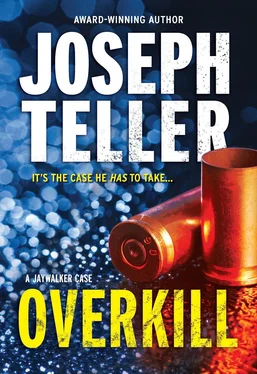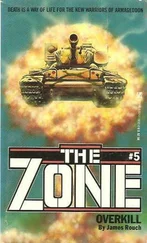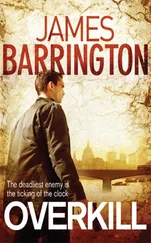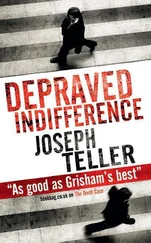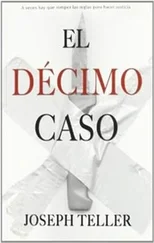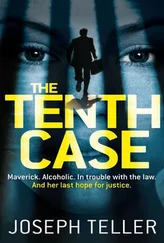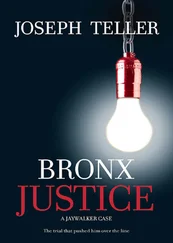Joseph Teller - Overkill
Здесь есть возможность читать онлайн «Joseph Teller - Overkill» — ознакомительный отрывок электронной книги совершенно бесплатно, а после прочтения отрывка купить полную версию. В некоторых случаях можно слушать аудио, скачать через торрент в формате fb2 и присутствует краткое содержание. Жанр: Криминальный детектив, на английском языке. Описание произведения, (предисловие) а так же отзывы посетителей доступны на портале библиотеки ЛибКат.
- Название:Overkill
- Автор:
- Жанр:
- Год:неизвестен
- ISBN:нет данных
- Рейтинг книги:3 / 5. Голосов: 1
-
Избранное:Добавить в избранное
- Отзывы:
-
Ваша оценка:
- 60
- 1
- 2
- 3
- 4
- 5
Overkill: краткое содержание, описание и аннотация
Предлагаем к чтению аннотацию, описание, краткое содержание или предисловие (зависит от того, что написал сам автор книги «Overkill»). Если вы не нашли необходимую информацию о книге — напишите в комментариях, мы постараемся отыскать её.
Overkill — читать онлайн ознакомительный отрывок
Ниже представлен текст книги, разбитый по страницам. Система сохранения места последней прочитанной страницы, позволяет с удобством читать онлайн бесплатно книгу «Overkill», без необходимости каждый раз заново искать на чём Вы остановились. Поставьте закладку, и сможете в любой момент перейти на страницу, на которой закончили чтение.
Интервал:
Закладка:
And she was good.
Not Jaywalker good, perhaps, but that could be said for pretty much the rest of the world. Still, she was comfortable on her feet and had a nice way with the jury. And she knew the case every bit as well as Jaywalker did. But while his delivery had brimmed with emotion, hers was grounded and factual. Missing from all the talk about Jeremy and Miranda and their puppy love, she told the jurors, was any possible explanation of how Victor Quinones had ended up with a bullet between his eyes, other than that offered by three eyewitnesses who were total strangers to one another, a medical examiner who knew none of the players, and a detective who might know nothing about millimeters but surely was capable of stretching a tape measure forty-five feet.
And as soon as she’d put it that way, the same jurors who’d nodded so enthusiastically during Jaywalker’s summation began doing the exact same thing during Darcy’s. She didn’t dispute the fact that Jeremy had been treated badly by Sandro and his friends. She acknowledged that the jurors would be less than human if they failed to feel sympathy for him. And she termed the group’s conduct during the barbershop incident nothing less than despicable. But then she reminded the jurors of their oaths and obligations. “What you may not do,” she told them, “is let your sympathy cloud your reason and your emotions eclipse your judgment.”
One by one, she reviewed the testimony of each witness who’d testified at the trial, leaning heavily on the observations of the three eyewitnesses, the autopsy findings, and the forty-five feet Jeremy had chased Victor before firing the final shot but had conveniently forgotten since. “He can’t admit it,” Darcy suggested, “because that would be the end of the case right there. But given the evidence, he can’t possibly deny it, either. So he does the only thing he can possibly do. He says he doesn’t remember it that way.” And as she paused to raise both eyebrows in an exaggerated expression of frank disbelief, Jaywalker felt himself slide ever so slightly lower in his chair.
Darcy did agree with Jaywalker on one point. She, too, told the jurors not to use extreme emotional disturbance to compromise on a manslaughter verdict. But where he’d asked them to acquit Jeremy altogether, she urged them to convict him of murder. “What it comes down to,” she said, “is that final, fatal shot. The one fired between the eyes at point-blank range. Until then, you might be able to stretch things almost to the breaking point and argue that the defendant was justified. Bringing the gun that morning, beating up Victor, maybe-and I say maybe -even firing the first shot. But then he closes that forty-five-foot distance, picks Victor’s head up from the pavement, places the business end of the gun within five inches or less of the bridge of Victor’s nose, ignores Victor’s plea for his life and pulls the trigger. That, ladies and gentlemen, is where justification ends and extreme emotional disturbance goes out the window.
“That’s where it becomes, if we were to use Mr. Jaywalker’s term, an execution. Personally, I reject that term and all the drama it suggests. I prefer to use the term overkill . Because that’s exactly what we have here, the use of deadly force when any conceivable need for deadly force no longer exists. But the truth is, you can forget Mr. Jaywalker’s term and you can forget mine. Execution, overkill , it makes no difference at all. Because the New York State Penal Law just happens to have a term of its own for it. It’s the very same term you’ll find in the indictment, and it’s the very same term Justice Wexler will use when he instructs you on the law in a few minutes. So here it is, here’s what they all choose to call it-
“Murder.”
Having spoken for just under an hour, Katherine Darcy thanked the jurors and sat down. It was close to two o’clock by that time, and Judge Wexler sent the jurors back to the jury room, where their lunch orders were waiting. Then he turned to the lawyers and told them to be back in forty-five minutes for the court’s charge.
The charge took the better part of an hour. Wexler began by instructing the jury on the general principles of law they were to follow, including the presumption of innocence, the burden of proof and reasonable doubt. Next he defined the various crimes charged in the indictment. “Murder,” he told them, “is causing the death of another person accompanied by the intent to cause death.”
Then he instructed them on the law of extreme emotional disturbance and justification. He made good on his promise to limit the defense’s claim of justification as much as he possibly could. “Even if you should find that the defendant was initially justified in using deadly physical force,” he told them, “the statute permits him to do so only to the extent he reasonably believes such force to be necessary to defend himself. If the evidence convinces you that at some point in the encounter he continued to use deadly physical force when he no longer believed such force was necessary to defend himself, you must find that his doing so was no longer justified, and you must find him guilty.”
And then, just in case any of the jurors had missed the point, he repeated himself verbatim.
He also cautioned them not to decide the case on the basis of sympathy, whether for the defendant, the victim or their family members. “Nor,” he added, looking directly at Jaywalker as he spoke, “should you let your emotions overcome your reason.” In the same vein, the subject of punishment was not theirs to consider; it was for the court alone to decide. Not possible punishment, Jaywalker noticed. Just punishment. Their verdict was to be unanimous on each count of the indictment, either guilty or not guilty. And if they needed further instructions, wished any portion of the testimony read back to them or wanted to see any of the exhibits received in evidence, they were to communicate with the court by having their foreman, Mr. Craig, send out a written note. But in no way was that note, or anything Mr. Craig might say in the courtroom, to divulge how the jury stood in terms of any votes taken on any of the charges.
“You may now retire,” he told them, “to begin your deliberations.”
Jaywalker looked at the clock, saw it was 3:56 p.m. It was something he would do hundreds, if not thousands, of times over the course of the hours to follow. He knew from years of experience that with the testimony over, the evidence in and the lawyers silenced, the clock would now become a major player in how things unfolded. Whether it had completely dawned on the jurors or not, they were sequestered, prisoners themselves after a fashion. Jaywalker liked that fact, and whenever it was left up to him he insisted that they be locked up, just so they could get a tiny taste of what it had to be like for the defendant. But at the same time he knew that sequestration could work against him, that as the hours passed and the jurors became more and more anxious to return to their families and their lives, justice could sometimes fall victim to expedience. And expedience often showed up looking an awful lot like compromise.
He looked again. 3:58 p.m.
The first note arrived at 4:49 p.m.
The receipt of a note from the jury invariably produces a tense moment in the courtroom. In order to transmit their note to the judge, the jurors must use a buzzer to summon one of the court officers, a buzzer loud enough to be heard in the courtroom. And although the jurors are instructed to buzz once if they have a note and twice if they’ve reached a verdict, they’ve been known to mix up those directions, leading to untold numbers of anxiety attacks or worse. So while this time there’d been only a single buzz, it was more than enough to get Jaywalker’s butterflies moving again.
Читать дальшеИнтервал:
Закладка:
Похожие книги на «Overkill»
Представляем Вашему вниманию похожие книги на «Overkill» списком для выбора. Мы отобрали схожую по названию и смыслу литературу в надежде предоставить читателям больше вариантов отыскать новые, интересные, ещё непрочитанные произведения.
Обсуждение, отзывы о книге «Overkill» и просто собственные мнения читателей. Оставьте ваши комментарии, напишите, что Вы думаете о произведении, его смысле или главных героях. Укажите что конкретно понравилось, а что нет, и почему Вы так считаете.
